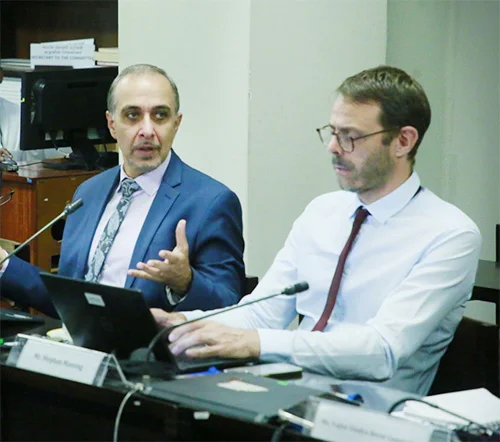The government is expected to table a draft Bill seekign to abolish pensions for Members of Parliament in a move that signals a shift toward trimming political privileges.Minister of Public Security and Parliamentary Affairs Ananda Wijepala announced the forthcoming legislation in Parliament yesterday, stating it would be presented at the next Cabinet meeting.
Minister Wijepala said that the Legal Draftsman’s Department has already finalised the proposed Bill, which is expected to be brought before Parliament next month.
This development comes as part of a broader initiative to reduce perks enjoyed by elected representatives.
In a related announcement, Minister Wijepala revealed that the long-standing practice of issuing vehicle permits to MPs has also been suspended.
The cost of pensions for former parliamentarians continues to place a significant burden on the public purse. In January alone, the state spent over Rs. 34.8 million on pensions for former MPs and their families. Of this, Rs. 23.3 million was paid to 328 former MPs, while Rs. 11 million went to the widows and widowers of 182 deceased MPs. An additional Rs. 421,000 was disbursed to support disabled children of ex-parliamentarians.
These figures came to light following a Right to Information (RTI) request filed by the Factseeker investigative team from the Sri Lanka Press Institute.
Even some of the nation’s highest office-holders have benefited from the parliamentary pension scheme. Former Presidents Mahinda Rajapaksa, Maithripala Sirisena, and Ranil Wickremesinghe each received pension payments in January, ranging between Rs. 85,000 and Rs. 90,000. Hema Premadasa, the widow of the late President Ranasinghe Premadasa, also received Rs. 75,000. Incumbent President Anura Kumara Dissanayake, who is also entitled to an MP pension, reportedly declined to accept his Rs. 78,690 payment.
President Dissanayake has publicly voiced support for ending the pension scheme, declaring in Parliament his intention to permanently abolish MPs’ pensions as part of a commitment to political reform and transparency.
The campaign to dismantle the pension system has found allies in Parliament. In February, New Democratic Front (NDF) MP Ravi Karunanayake tabled a Private Members’ Motion advocating for the abolition of MPs’ pensions. Addressing fellow legislators, Karunanayake underscored the damage caused to public trust by the perception of politicians benefiting unfairly from state resources.
“A certain political party has manipulated this issue to erode faith in this institution. If we don’t act now, Parliament will be seen as no more important than a municipal council,” Karunanayake said. He argued that eliminating pensions is a crucial step toward restoring the credibility of lawmakers and re-establishing Parliament as a body that genuinely serves the people.
